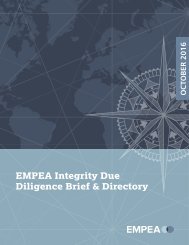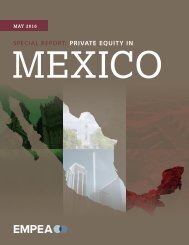You also want an ePaper? Increase the reach of your titles
YUMPU automatically turns print PDFs into web optimized ePapers that Google loves.
EXECUTIVE SUMMARY<br />
In April 2015, FSD Africa (FSDA) and EMPEA Consulting<br />
Services surveyed 118 individuals active in Sub-Saharan<br />
African private equity from over 90 firms in order to better<br />
understand how industry participants view fund domiciles—<br />
both onshore and <strong>of</strong>fshore—including how satisfied they<br />
are with their current jurisdictions and which factors are<br />
most important to them when choosing a location for<br />
their funds. The survey also seeks to uncover just how<br />
much industry interest there is in the broader adoption <strong>of</strong><br />
onshore domiciles across the continent; and, where and<br />
how the development <strong>of</strong> onshore domiciles could best be<br />
facilitated. We hope the findings <strong>of</strong> this analysis provide the<br />
industry—and stakeholders more broadly—with a greater<br />
understanding <strong>of</strong> the role that fund domiciles play as<br />
conduits for investment into Sub-Saharan Africa, why they<br />
are important for private equity participants and partners,<br />
and what can be done to improve both existing and new<br />
potential jurisdictions.<br />
Key findings from the EMPEA 2015 African Fund<br />
Domicile Survey include:<br />
I. The use <strong>of</strong> <strong>of</strong>fshore jurisdictions is standard<br />
practice for Sub-Saharan Africa’s private equity<br />
industry. The majority <strong>of</strong> the 59 GPs participating in<br />
the survey (nearly 75%) have chosen an <strong>of</strong>fshore<br />
jurisdiction for their largest currently active private<br />
equity fund, with Mauritius leading as the most popular<br />
jurisdiction (30) followed by Jersey / Guernsey (5). Of<br />
those fund managers who have chosen an onshore<br />
jurisdiction, most (13) are structured in South Africa.<br />
II. The prevalence <strong>of</strong> <strong>of</strong>fshore structures—including<br />
the use <strong>of</strong> Mauritius—is largely explained by the<br />
weight industry participants place on a domicile’s<br />
tax efficiency for distributions. Approximately 61%<br />
<strong>of</strong> GPs and 64% <strong>of</strong> SPs cite this consideration as<br />
important in a fund domicile. Of note, LPs place greater<br />
importance on transparency than tax efficiency, with<br />
44% citing it as a leading factor in their preference for a<br />
fund domicile.<br />
III. The vast majority <strong>of</strong> the industry views Mauritius<br />
favourably despite the fact that the market has<br />
come under political criticism in recent years,<br />
and is viewed suspiciously by some civil society<br />
groups. GPs with vehicles domiciled in Mauritius give<br />
it a high approval rating, with 97% <strong>of</strong> respondents<br />
reporting that they are satisfied or very satisfied with<br />
the jurisdiction. When asked if they had any concerns<br />
about Mauritius as a domicile, only 17% <strong>of</strong> all survey<br />
participants responded yes—a ratio that is relatively<br />
consistent across LP, GP and SP respondents.<br />
IV. Concerns about Mauritius appear to be stronger<br />
among DFIs, with 33% <strong>of</strong> DFIs expressing caution<br />
compared to 17% <strong>of</strong> all LPs. Moreover, 75% <strong>of</strong> the<br />
total LP respondents who expressed concerns about<br />
Mauritius were representatives from DFIs. In general,<br />
LPs’ biggest concerns pertain to transparency and<br />
exchange <strong>of</strong> tax information, and the degree <strong>of</strong> civil<br />
society / political criticism attendant with the domicile,<br />
whilst GPs—perhaps unsurprisingly—are primarily<br />
worried about LP concerns. That said, the attitude <strong>of</strong><br />
DFIs toward Mauritius differs by institution. Some DFIs<br />
do not have an issue with Mauritius per se, but rather<br />
with the tax treatment <strong>of</strong> certain corporate investment<br />
vehicles permissible in the country, which they regard<br />
as a harmful tax practice.<br />
V. Despite the prevalence <strong>of</strong> <strong>of</strong>fshore funds in<br />
the industry, the majority <strong>of</strong> the GP and LP<br />
survey participants have experience with—or<br />
have expressed an openness to—onshore fund<br />
domiciles. With respect to the GPs, 26% report that<br />
they relied upon onshore domiciles for parallel / feeder<br />
funds as part <strong>of</strong> a broader fundraising effort, whilst<br />
20% relied exclusively upon an onshore domicile. An<br />
additional 31% <strong>of</strong> GPs would consider domiciling in an<br />
onshore African country in the next three to five years.<br />
In the case <strong>of</strong> LPs, 46% <strong>of</strong> surveyed participants have<br />
committed to an onshore vehicle while an additional<br />
44% would consider doing so.<br />
<strong>Conduits</strong> <strong>of</strong> <strong>Capital</strong> – Onshore Financial Centres and Their Relevance to African Private Equity<br />
| 13





